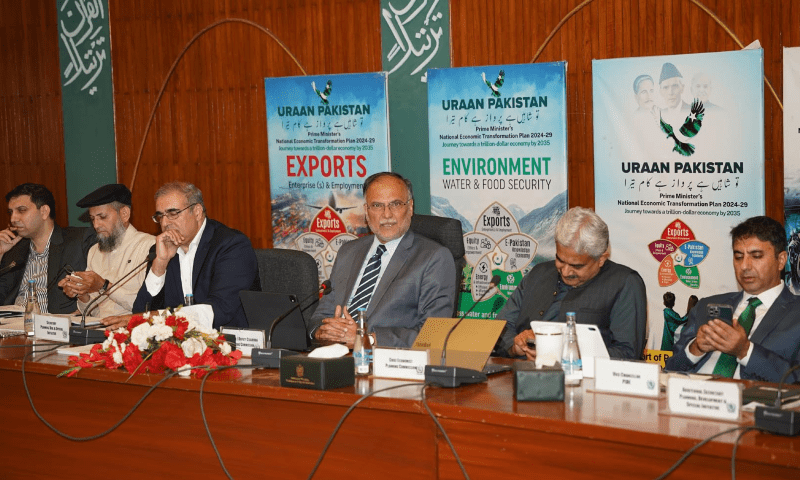ISLAMABAD: The Central Development Working Party (CDWP) on Friday cleared 10 development projects worth Rs143 billion, including a Rs41bn initiative to revamp the Federal Board of Revenue (FBR), enabling the government to secure a $150 million loan from the World Bank despite a more than 225 per cent increase in project costs.
The CDWP meeting, presided over by Planning Minister Ahsan Iqbal, also cleared Rs27bn expansion of laptop scheme in Punjab and Sindh’s Rs60bn worth of three major projects in the roads and education sectors.
The meeting requested the Executive Committee of the National Economic Council (Ecnec) to formally approve five projects worth Rs127.1bn and itself approved five other projects worth Rs15.9bn.
Under the current financial rules, the CDWP is empowered to approve projects costing up to Rs7.5bn, while the projects of higher estimated costs are approved by Ecnec on the recommendations of the CDWP after clearance on technical grounds.
The meeting approved the “Construction of Academic Blocks of National University of Pakistan, Islamabad (New)” project worth Rs1.597bn, “Formulation of National Urban Strategy and Guidelines to Reduce the Impact of Urban Flooding, Droughts, Climate Disasters and National Guidelines for Spatial Planning Considering Climate Change/Disaster Risk in Pakista” at a cost of Rs106.401m fully funded by UN-Habitat, and “Establishment of Mirwaiz Molvi Muhammad Farooq Shaheed Medical College Muzaffarabad and Kashmir Medical College Muzaffarabad” with a cost of Rs4.338bn.
The CDWP also approved another Rs2.455bn project in the higher education sector, “IT Industrial Innovation, Research Centre and Strengthening of Islamia College University, Peshawar”, and a Rs7.43bn project related to the Information Technology sector, namely “Revamping IT Industry Landscape”.
A key project forwarded to Ecnec was the “Investment Projects Financing (IPF) Component of the Pakistan Raises Revenue Project”, valued at Rs40.758bn. Funded by a $150m World Bank loan, the project aims to transform the FBR through technology-based reforms and broaden the tax base.
Originally estimated at Rs12.5bn in 2020, the project cost has increased significantly due to delays, exchange rate fluctuations and the inclusion of new components under the prime minister’s FBR transformation programme.
The CDWP also requested Ecnec to formally approve the Rs27bn “CM Punjab Laptop Programme” to distribute laptops to about 112,000 students currently enrolled in public sector educational institutions across the province.
A Sindh government project related to physical planning and housing — “Construction / Reconstruction of Existing Schools in Sindh Affected under 2022 Floods” — worth Rs12.337bn was also referred to Ecnec for approval. The project is sponsored and executed by the provincial government and aims to reconstruct damaged schools, with priority given to those severely affected by the 2022 rains and floods, as verified by the Education Works Division.
Two other projects in Sindh related to transport and communications were also referred to the Ecnec for approval. They are “Extension / Construction of Sindh Coastal Highway Phase II” at a cost of Rs37.718bn. The project involves the extension and construction of a 36km section of the Sindh Coastal Highway, featuring a 14.5-metre formation width, a 7.3-metre two-lane single carriageway, three-metre paved shoulders, and 0.6-metre earthen shoulders on each side.
The second project was “Dualisation of Tando Allahyar-Tando Adam Road” worth Rs9.285bn.
During the meeting, Planning Minister Ahsan Iqbal directed that only those projects that improve institutional performance and contribute to national development be included in the Public Sector Development Programme. He stressed aligning the development portfolio with the Uraan Pakistan priorities and ensuring continuity and innovation in future projects.
He also directed his own ministry to develop a mechanism for notifying construction rates for highway and building projects, in light of the accurate cost of construction, and thorough scrutiny of projects should be ensured by sponsoring departments to avoid inflated costs. He directed the Higher Education Commission and the Punjab government to coordinate on laptop procurement to consolidate the demand for the next four years and invite leading laptop manufacturers to set up plants in Pakistan.
Published in Dawn, May 17th, 2025


